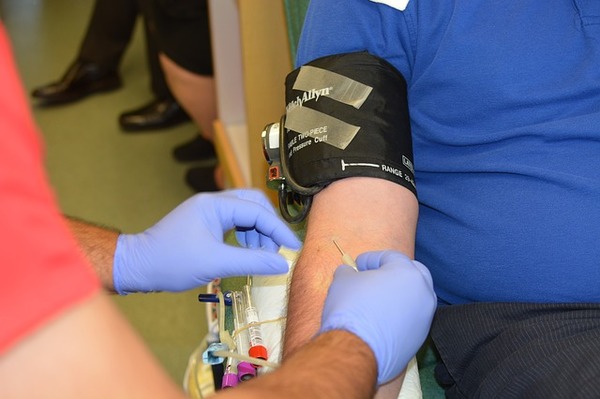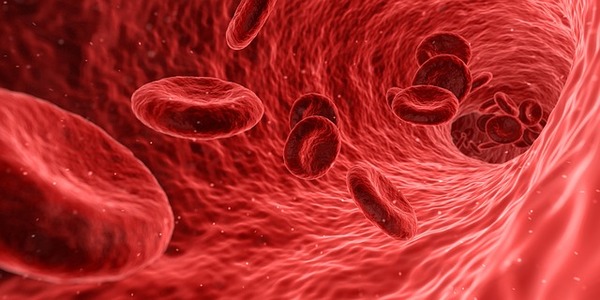I donated blood for the first time about a year ago. Fortunately, everything went well. I didn't have a bad reaction or anything. So naturally, when I went to donate again recently I assumed everything would go okay this time too. But people can and do have negative reactions. It isn't a big deal though but it can be very unpleasant and even a little scary. I've worked in the medical field so I knew these reactions could happen and I wasn't too freaked out when it happened to me. I was a little surprised though. I thought I had done everything that they tell you to do beforehand to prevent it.
Everything started out fine. I don't have an issue with needles or anything like that and the entire process takes about 15 or 20 minutes so just played on my phone the entire time. It wasn't they were almost done taking the full amount of blood they needed that I started feeling bad. At that point, I told the staff what was going on. I started feeling very lightheaded. Then I felt nauseated and felt like I might pass out. I also felt kind of cold. My abilities to hear decreased a lot too. The staff was great though. They jumped into action to take care of me. They laid my chair back so I could lie down. They told me to cough really hard and to tap my feet together. And as soon as it was safe to do so they let me sit back up (after they were finished taking my blood) and let me have some apple juice and some chips.
I started feeling better almost immediately, so I only felt sick for about 5 minutes at the most. But I was really surprised. I thought I had done everything necessary to prevent this. They check your iron levels before they even let you donate and mine were fine. I hadn't been feeling sick or anything. I don't have a needle phobia. I had gotten plenty of sleep the night before so I was well rested. I ate a good meal a few hours before I went. But there was one big thing I forgot to do. I forgot to drink plenty of water. You're supposed to drink at least an extra 16 ounces of water before you donate blood to help replace all the fluid your body is going to lose. I had completely neglected to do that. In fact, I had been so busy I hadn't had much water at all. Opps.
But that's okay. That's why the staff is trained in how to handle it when people have bad reactions. Even if you do everything right before you donate you can still have a negative reaction, it's just less likely to occur.
But I guess the real question is, will I donate again? Yes. Why? Because even though I had a very unpleasant reaction I know more about how to prevent it from happening in the future. And even if it happens again I think going through a little bit of discomfort is worth it considering all the good it does. According to the Red Cross, someone in the U.S. needs blood every two seconds. And just one donation of blood can save up to three people's lives. I think that's wonderful. I can handle a few minutes of feeling bad in order to possibly save the lives of three people.
Plus, it's very safe. The body doesn't like to lose blood. But it doesn't understand if you are losing blood because you've been in an accident or if you're losing blood in a very controlled environment with trained medical staff that are only going to take a safe amount. So it's understandable that sometimes your body might react negatively to that situation. But the second I told them I felt bad they jumped into action to help take care of me. I never once felt unsafe or thought that my condition could get worse.
And donating blood could have health benefits for the donor too. Other than making you feel good mentally because you know you've helped someone else, a 2013 study found that it could help reduce the risk of heart disease. It might even lower the risk of developing certain cancers according to another study.
So even though you might have a negative reaction, they are preventable if you make sure to drink plenty of fluid beforehand (which I forgot to do this time), eat a good meal, make sure you are well rested, and make sure your iron levels are good. And if you do have a bad reaction, it won't last very long and the staff is trained in how to deal with it and keep you safe.
References:
HemeCare.com. Tips For A Successful Donation. Accessed at https://www.hemacare.com/donate-blood/about-donating/tips-for-a-successful-donation on August 19, 2018.
NCBI.com. Lipid profile of regular blood donors. Accessed at https://www.ncbi.nlm.nih.gov/pmc/articles/PMC3663474 on August 19, 2018.
Academic.oup.com. Donation Frequency, Iron Loss, and Risk of Cancer Among Blood Donors. Accessed at https://academic.oup.com/jnci/article/100/8/572/927859 on August 19, 2018.





























